August 12, 2025
Hoosier Cancer Research Network (HCRN) is proud to welcome nine new co-chairs across its clinical trial working groups. These accomplished leaders bring expertise, a dedication to investigator-initiated research, and a shared passion for teamwork that drives discovery forward. Through HCRN, investigators unite to propose clinical trials and share scientific insights. The leadership of these new co-chairs will strengthen the network’s efforts to foster team science and deliver innovative clinical trials to patients across the country.
Breast Cancer Clinical Trial Working Group
Neelima Vidula, MD – Massachusetts General Hospital
 Dr. Neelima Vidula is dedicated to bridging the gap between discovery and patient care. As a breast medical oncologist and principal investigator for numerous early-phase clinical trials, she focuses on advancing novel therapies, precision medicine, and biomarker-driven strategies for breast cancer treatment. Dr. Vidula has led national multi-center studies, presented her research internationally, and earned recognition for innovative trial design.
Dr. Neelima Vidula is dedicated to bridging the gap between discovery and patient care. As a breast medical oncologist and principal investigator for numerous early-phase clinical trials, she focuses on advancing novel therapies, precision medicine, and biomarker-driven strategies for breast cancer treatment. Dr. Vidula has led national multi-center studies, presented her research internationally, and earned recognition for innovative trial design.
“I look forward to working with a talented group of investigators in developing and conducting clinical trials to help improve treatment options for patients with breast cancer,” Dr. Vidula said.
Alison Conlin, MD, MPH – Providence Cancer Institute
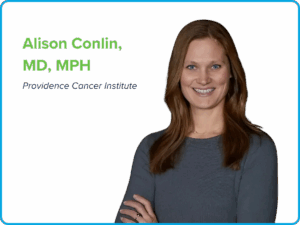 Dr. Alison Conlin leads the breast cancer program in medical oncology at Providence Cancer Institute in Portland, Ore. With a background in both clinical care and public health, she is committed to improving access to clinical trials for patients across all stages of breast cancer. Her research has focused on advanced disease, cancer prevention, and survivorship care.
Dr. Alison Conlin leads the breast cancer program in medical oncology at Providence Cancer Institute in Portland, Ore. With a background in both clinical care and public health, she is committed to improving access to clinical trials for patients across all stages of breast cancer. Her research has focused on advanced disease, cancer prevention, and survivorship care.
“Our community cancer center in Oregon has truly enjoyed working with HCRN over the years in treating many cancer types,” Dr. Conlin said. “HCRN is able to bring innovative strategies to our patients being cared for all over the country. I’m especially excited for upcoming concepts for our patients with HER2-positive metastatic breast cancer.”
Drs. Vidula and Conlin join continuing co-chair Carey Anders, MD, of Duke Cancer Institute.
Correlative Sciences Working Group
David A. Braun, MD, PhD – Yale Cancer Center
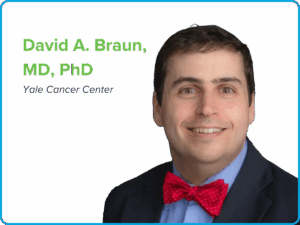 Dr. David Braun is a physician-scientist whose work bridges computational biology, immuno-oncology, and translational medicine. As an assistant professor of medicine and the Louis Goodman and Alfred Gilman Yale Scholar at Yale School of Medicine, Dr. Braun focuses on understanding how the immune system interacts with kidney cancers and how those insights can be applied to develop personalized therapies. His research explores how the tumor microenvironment and immune evasion mechanisms affect treatment response, particularly in renal cell carcinoma.
Dr. David Braun is a physician-scientist whose work bridges computational biology, immuno-oncology, and translational medicine. As an assistant professor of medicine and the Louis Goodman and Alfred Gilman Yale Scholar at Yale School of Medicine, Dr. Braun focuses on understanding how the immune system interacts with kidney cancers and how those insights can be applied to develop personalized therapies. His research explores how the tumor microenvironment and immune evasion mechanisms affect treatment response, particularly in renal cell carcinoma.
Dr. Braun joins continuing co-chair Hatim Sabaawy, MD, PhD, MS, of the University of Colorado Cancer Center.
Gastrointestinal Clinical Trial Working Group
Ibrahim Halil Sahin, MD – University of Michigan Rogel Cancer Center
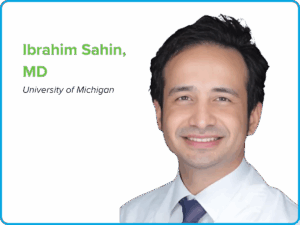 Dr. Ibrahim Sahin is a medical oncologist and nationally recognized expert in colorectal cancer, with a focus on designing and leading clinical trials for patients with advanced-stage disease. His research explores innovative approaches using immunotherapy and targeted therapy to expand treatment options for patients with colorectal cancer. Board-certified in medical oncology and internal medicine, Dr. Sahin has trained and conducted research at leading institutions, earning recognition for his contributions to clinical cancer research in the space of precision oncology and immunotherapy.
Dr. Ibrahim Sahin is a medical oncologist and nationally recognized expert in colorectal cancer, with a focus on designing and leading clinical trials for patients with advanced-stage disease. His research explores innovative approaches using immunotherapy and targeted therapy to expand treatment options for patients with colorectal cancer. Board-certified in medical oncology and internal medicine, Dr. Sahin has trained and conducted research at leading institutions, earning recognition for his contributions to clinical cancer research in the space of precision oncology and immunotherapy.
“HCRN creates a welcoming environment for the evolution of ideas into investigator-initiated clinical trials, where we can better understand the therapeutic efficacy and safety of novel agents or combinations,” Dr. Sahin said. “These collaborations create a unique opportunity to expedite cancer research in a meaningful way and improve patient care and outcomes.”
Dr. Sahin joins continuing co-chairs Patrick Boland, MD, of Rutgers Cancer Institute, and Sarbajit Mukherjee, MD, MS, of Baptist Health Miami Cancer Institute.
Melanoma Clinical Trial Working Group
Anna Pavlick, DO, MBA – Weill Cornell Medicine
 Dr. Anna Pavlick is a medical oncologist with more than 20 years of experience treating patients with melanoma and other complex skin cancers, including ocular and rare solid tumor malignancies. She serves as professor of medicine and founding director of the Cutaneous Oncology Program at Weill Cornell Medicine and New York-Presbyterian. Dr. Pavlick’s research focuses on advancing targeted therapies, immunotherapies, and combination approaches, as well as improving patient quality of life through outcomes research.
Dr. Anna Pavlick is a medical oncologist with more than 20 years of experience treating patients with melanoma and other complex skin cancers, including ocular and rare solid tumor malignancies. She serves as professor of medicine and founding director of the Cutaneous Oncology Program at Weill Cornell Medicine and New York-Presbyterian. Dr. Pavlick’s research focuses on advancing targeted therapies, immunotherapies, and combination approaches, as well as improving patient quality of life through outcomes research.
Michael C. Lowe, MD, MA – Emory University Winship Cancer Institute
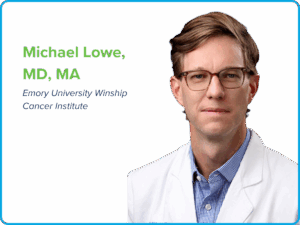 Dr. Michael Lowe is an associate professor of surgery in the Division of Surgical Oncology at Emory University School of Medicine and serves as disease team lead for melanoma at Winship Cancer Institute. A board-certified surgical oncologist, Dr. Lowe specializes in the treatment of cutaneous malignancies, including melanoma, basal cell carcinoma, and Merkel cell carcinoma. His research focuses on immune-based approaches to melanoma treatment, including investigations into T cell response mechanisms and novel strategies to overcome immune suppression in tumor environments.
Dr. Michael Lowe is an associate professor of surgery in the Division of Surgical Oncology at Emory University School of Medicine and serves as disease team lead for melanoma at Winship Cancer Institute. A board-certified surgical oncologist, Dr. Lowe specializes in the treatment of cutaneous malignancies, including melanoma, basal cell carcinoma, and Merkel cell carcinoma. His research focuses on immune-based approaches to melanoma treatment, including investigations into T cell response mechanisms and novel strategies to overcome immune suppression in tumor environments.
Arkadiusz Z. Dudek, MD, PhD – Mayo Clinic
 Dr. Arkadiusz Dudek is a medical oncologist with more than 20 years of experience treating melanoma and other skin cancers. His research focuses on developing novel cancer therapeutics, including early-phase trials with small molecules, cell-based therapies, and innovative immunotherapy approaches. Dr. Dudek has made significant contributions to understanding the interplay between tumor angiogenesis and tumor immunology and is particularly focused on improving treatment options for patients with uveal and mucosal melanoma.
Dr. Arkadiusz Dudek is a medical oncologist with more than 20 years of experience treating melanoma and other skin cancers. His research focuses on developing novel cancer therapeutics, including early-phase trials with small molecules, cell-based therapies, and innovative immunotherapy approaches. Dr. Dudek has made significant contributions to understanding the interplay between tumor angiogenesis and tumor immunology and is particularly focused on improving treatment options for patients with uveal and mucosal melanoma.
“HCRN excels in the swift application of research ideas to clinical trials. Phase 1 and smaller phase 2 studies facilitated by HCRN allow for rapid testing of research hypotheses, and, through close collaboration with pharmaceutical partners, advancement of winning therapies to phase 3 studies led by industry,” Dr. Dudek said. “My goal will be to solicit and support research ideas that address significant gaps in melanoma and skin cancer practice.”
Thoracic Clinical Trial Working Group
Regan M. Memmott, MD, PhD – The Ohio State University Comprehensive Cancer Center – The James
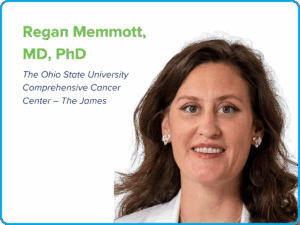 Dr. Regan Memmott is a medical oncologist and assistant professor in the College of Medicine at The Ohio State University, where she leads a translational research program dedicated to improving outcomes for patients with lung cancer. Her work focuses on understanding how resistance to targeted therapies occurs, particularly in EGFR- and ALK-driven lung cancers, and developing new combination strategies to prevent resistance. In addition to leading laboratory investigations, Dr. Memmott serves as principal investigator for early-phase clinical trials designed to rapidly bring these discoveries from bench to bedside.
Dr. Regan Memmott is a medical oncologist and assistant professor in the College of Medicine at The Ohio State University, where she leads a translational research program dedicated to improving outcomes for patients with lung cancer. Her work focuses on understanding how resistance to targeted therapies occurs, particularly in EGFR- and ALK-driven lung cancers, and developing new combination strategies to prevent resistance. In addition to leading laboratory investigations, Dr. Memmott serves as principal investigator for early-phase clinical trials designed to rapidly bring these discoveries from bench to bedside.
“HCRN not only gives investigators the opportunity to unite in their design of innovative clinical trials but also to collaborate on the best use of clinical samples for biomarker-driven research,” Dr. Memmott said.
Ece Cali Daylan, MD, PhD – Washington University in St. Louis
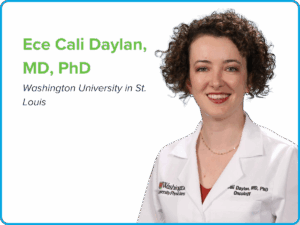 Dr. Ece Cali Daylan is an assistant professor of oncology specializing in lung cancer at Washington University in St. Louis. With a dual background in medicine and medical biology, Dr. Cali focuses her research on understanding aggressive lung cancer subtypes with poor clinical outcomes. Her work aims to uncover molecular alterations and cellular pathways that drive disease progression and resistance to therapy, paving the way for innovative treatment approaches and biologically driven clinical trials. Beyond her research, Dr. Cali is deeply engaged in mentoring and medical education, helping shape the next generation of oncology physicians and scientists.
Dr. Ece Cali Daylan is an assistant professor of oncology specializing in lung cancer at Washington University in St. Louis. With a dual background in medicine and medical biology, Dr. Cali focuses her research on understanding aggressive lung cancer subtypes with poor clinical outcomes. Her work aims to uncover molecular alterations and cellular pathways that drive disease progression and resistance to therapy, paving the way for innovative treatment approaches and biologically driven clinical trials. Beyond her research, Dr. Cali is deeply engaged in mentoring and medical education, helping shape the next generation of oncology physicians and scientists.
“As co-chair, I’m excited to help lead HCRN’s efforts to design biologically informed, pragmatic and patient-centered trials that incorporate translational science,” Dr. Cali said. “HCRN is uniquely positioned to foster multi-institutional collaboration to study novel treatment combinations and ultimately improve outcomes for patients with high-risk disease or rare subtypes.”
Drs. Memmott and Cali join continuing co-chair Nagla Abdel Karim, MD, of George Washington University.
Join an HCRN Clinical Trial Working Group
Hoosier Cancer Research Network invites investigators from our member institutions to participate in Clinical Trial Working Groups. Through regular teleconferences and occasional in-person meetings, the group remains active throughout the lifetime of HCRN studies. Fostering an environment of mentorship, these groups are ideal for physicians at all levels in both academic and community settings. CTWGs provide investigators with opportunities to: evaluate concepts during the development and design of a protocol; receive input on concepts from key opinion leaders; co-author publications; share best practices in clinical oncology; and meet with funders to discuss areas of interest and concept submission guidelines. Researchers interested in contributing to these efforts are invited to join a working group here.
About Hoosier Cancer Research Network
Hoosier Cancer Research Network conducts innovative cancer clinical trials in collaboration with more than 100 academic and community clinical research sites across the United States. Our studies are designed by cancer researchers from our member institutions. The HCRN staff includes 55 team members who work together to support all aspects of the studies we manage, from the time we receive the initial concept from a researcher through the final publication of the study results. Currently, we are supporting more than 70 clinical trials across a wide range of cancer types. Over our 40-year history, more than 10,000 participants have enrolled in our clinical trials, leading to important discoveries that help cancer patients live longer and better after their cancer diagnosis.

